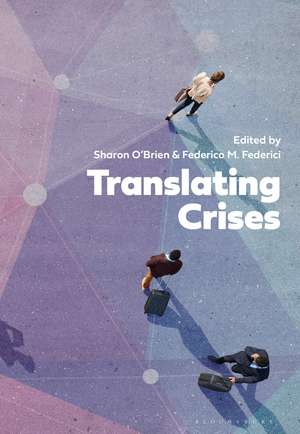Translating Crises
Editat de Dr Sharon O'Brien, Dr Federico M. Federicien Limba Engleză Hardback – 16 noi 2022
Preț: 673.52 lei
Preț vechi: 1196.99 lei
-44% Nou
Puncte Express: 1010
Preț estimativ în valută:
128.90€ • 133.16$ • 107.27£
128.90€ • 133.16$ • 107.27£
Carte disponibilă
Livrare economică 04-18 martie
Preluare comenzi: 021 569.72.76
Specificații
ISBN-13: 9781350240087
ISBN-10: 1350240087
Pagini: 464
Ilustrații: 38 bw
Dimensiuni: 169 x 244 mm
Greutate: 0.45 kg
Editura: Bloomsbury Publishing
Colecția Bloomsbury Academic
Locul publicării:London, United Kingdom
ISBN-10: 1350240087
Pagini: 464
Ilustrații: 38 bw
Dimensiuni: 169 x 244 mm
Greutate: 0.45 kg
Editura: Bloomsbury Publishing
Colecția Bloomsbury Academic
Locul publicării:London, United Kingdom
Caracteristici
The collection has a global reach, representing the geographical and political constraints of operations taking place in Chile, India, Ireland, Italy, Japan, New Zealand, Spain, Switzerland, the UK, and the USA
Notă biografică
Sharon O'Brien is Professor of Translation Studies at Dublin City University, Ireland. Federico M. Federici is Professor of Intercultural Crisis Communication at University College London, UK.
Cuprins
List of FiguresList of TablesNotes on ContributorsIntroduction: Crisis Translation beyond Words into Action, Sharon O'Brien (Dublin City University, Ireland) and Federico M. Federici (University College London, UK)Part I: Concepts and Policies 1. Ethical Considerations in the Translation of Health Genres in Crisis Communication, Vicent Montalt (Universitat Jaume I, Spain)2. Extending the Value of Crisis Translation in Crisis Communication, Timothy Coombs and Elina Tachkova (Texas A&M University, USA)3. The Impact of Misinformation in Crises and the Need for Risk Management, Kayo Matsushita (Rikkyo University, Japan) and Miyuki Inoue (HuffPost, Japan)4. Translating Personal Narratives of Crisis in Graphic Novels, Marija Todorova (Hong Kong Polytechnic University, Hong Kong) and Zoran Poposki (Education University of Hong Kong, Hong Kong)5. The Perspectives of Military Personnel on Interpreters in Violent Conflicts, Carmen Valero Garcés (University of Alcalá, Madrid, Spain)6. Are Safety Signs Truly Universal when a Crisis Arises? Adriano da Silva (Institute of Language Studies at State University of Campinas, Brazil) and Sharon O'Brien (Dublin City University, Ireland)7. Translating Scholarly Knowledge in Times of Crisis, Rafael Y. Schögler (University of Graz, Austria)Part II: Practices, People, Technologies, Processes 8. A Multiparty Perspective on the Provision of Signed Language Interpreters during the COVID-19 Press Briefings in Belgium, Karolien Gebruers (KU Leuven, Belgium), Lien Vermeire (National Crisis Centre, Belgium) and Jaron Garitte9. Language and Literacy Brokering in the Covid-19 Emergency, Rachele Antonini (University of Bologna, Italy) and Claudia Suprani (Istituto Comprensivo 1, Forlì, Italy)10. Digital Multilingual Practices in Third-Sector Organisations, María Jiménez-Andres and Pilar Orero (Universitat Autònoma de Barcelona, Spain)11. Becoming a Translator Amidst Crises, Néstor Singer (Universidad de Santiago de Chile)12. The Role of Translation in Ensuring Children's and Family's Rights and Psychological Well-Being in the Context of the Migration Crisis at the United States-Mexico Border, Danielle Gonzalez (Palo Alto University, USA), Ryan Matlow (Stanford University, USA) and Lisa M. Brown (Palo Alto University, USA)13. Accessible Crisis Communication for the Blind and the Visually Impaired in Multilingual Settings, Silvia Rodríguez Vázquez (University of Geneva, Switzerland) 14. Cultural Mediation as a Means of Effective Multilingual Communication, Maura Radicioni and Lucía Ruiz Rosendo (University of Geneva, Switzerland)15. Patient Acceptance of Translation Technology for Medical Dialogues in Emergency Situations, Johanna Gerlach, Pierrette Bouillon, Rovena Troqe, Sonia Halimi (Université de Genève, Switzerland) and Hervé Spechbach (Geneva University Hospitals, Switzerland)16. Universal Access through Mobile Devices in Multilingual Websites on the COVID-19 Pandemic, Lucía Morado Vázquez (University of Geneva, Switzerland) and Jesús Torres-del-Rey (University of Salamanca, Spain)17. India's Frontline Health Response to COVID-19: Language and Culture in Pandemics, Sneha Krishnan (Jindal Global University, India), Rohini Menon (ETCH Consultancy Services, India) and Deepshikha Purwar (University of Twente, The Netherlands)18. The Transformative Power of Wordless Picturebooks in Multilingual And Multicultural Contexts, Debbie Thomas (IBBY Project Officer, Ireland) and Áine McGillicuddy (Dublin City University, Ireland)Part III: Frontline Experience 19. Professional Interpreters and their Associations in the Crisis Landscape, Annette Schiller, (Regional Centre for Europe of the International Federation of Translators) and John O'Shea, (Legal Translator)20. The Role of Translation in the Fight for Human Rights, Lucio Bagnulo (Amnesty International)21. Language, Culture and Access to Healthcare during the COVID-19 Outbreak in Italy, David Lloyd Webber (EMERGENCY, UK) and Eleonora Del Gaudio (EMERGENCY, Italy)22. Accommodating Language Needs of Refugee-Background Communities in New Zealand, Celia Brandon and Dennis Maang (New Zealand Red Cross)23. A Case Study on the Role of Translation and Cultural Adaptation in GOAL's Information Campaigns, Wine Tesseur (Dublin City University, Ireland), Isaac Chaipa (GOAL Zimbabwe), Enida Friel (GOAL Global), Luigi Loddo (GOAL Honduras), Sahady Mencia (GOAL Honduras) and Thandolwenkosi Sibindi (GOAL Zimbabwe).24. Communicating with England's Homeless during the COVID-19 Pandemic Lockdown, Aisha Maniar (Independent Researcher, UK)25. Addressing Language Barriers to Provide Inclusive Assistance to Migrants And Refugees, Lorenzo Guadagno (International Organization for Migration, Switzerland) and Reshma Matthews (International Organisation for Migration, Switzerland)Index
Recenzii
Translating Crises is a highly relevant and timely contribution, responding to the social needs of the moment. Its depth and breadth of contributions on crisis translation/interpreting are truly remarkable. Being both research-based and practice-oriented, it is likely to become a go-to volume for everyone interested in this topic.
An essential work on crisis translation from two of the leading figures in the field. Dr. O'Brien and Dr. Federici gather in this volume the pioneering views of scholars, established professionals, committed NGO workers and human rights specialists, who provide a global insight into the cross-disciplinary area of Intercultural communication in crisis settings.
An essential work on crisis translation from two of the leading figures in the field. Dr. O'Brien and Dr. Federici gather in this volume the pioneering views of scholars, established professionals, committed NGO workers and human rights specialists, who provide a global insight into the cross-disciplinary area of Intercultural communication in crisis settings.
